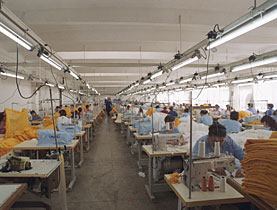Businesses challenged over human rights

Economics Minister Doris Leuthard has called for Swiss companies to take responsibility – and lead the way – on the issue of business and human rights.
She was speaking at a conference on the subject at Rüschlikon, near Switzerland’s main financial centre of Zurich, on Monday.
Leuthard said it was not up to only the state to protect human rights.
“Companies have their corporate responsibility with their presence, with a code on how to treat people within the companies, but also with how they try to support governments to implement human rights,” she told swissinfo on the sidelines of the conference.
“Therefore it’s not whether we should do it, it’s a question how we can do it,” she said.
Leuthard added the government believed that Swiss companies, which always want to be among the global leaders, would “have to reflect responsibly on human rights as well as on environmental issues”.
The conference, which was organised by the Zurich branch of the non-governmental organisation (NGO) Human Rights Watch, looked at how this could be achieved.
For many years human rights was seen as the domain of governments. But globalisation has meant that issues such as child labour, corruption and discrimination now have to be considered by international companies.
Questions over large western multinationals’ use of Asian sweatshops to produce cheap garments or Swiss pharmaceutical companies’ use of patents in poorer countries have also brought the topic into the public domain.
Consumers, the conference heard, now see business as partly responsible for improving the human rights situation in developing countries, a situation which also affects Switzerland.
Swiss situation
“Some of the very large Swiss multinationals such as [drugs giant] Novartis have been involved right from the outset [of the human rights debate]. There have also been some small and medium-sized businesses, like the T-shirt company Switcher, which has been very active,” said Human Rights Watch Zurich chairman Thomas Bechtler.
“But overall in Switzerland the debate is just starting,” he told swissinfo.
The challenges facing companies vary by sector, he explained. Delegates heard from Credit Suisse that the bank tried to deter “undesirable clients” through a risk review process.
Firms may opt for internal human rights policies and sign up to international voluntary agreements, such as the United Nations Global Compact.
For Klaus Leisinger, head of Novartis’s Sustainable Development Foundation, it is important for companies to play a leading role.
“This is a debate that should not be led by NGOs only because they, in good faith, have a different role in society and approach the issue from a different perspective,” he told swissinfo.
“It doesn’t make sense that they come to a conclusion that is then put in front of your door and you would then have to say yes or no,” he added.
Slow change
There are signs that more and more companies, also mindful of the fallout from a bad human rights reputation, are considering human rights. More than 3,500 firms – including 51 Swiss companies and institutions – have signed Global Compact.
However, NGOs have expressed frustration that business measures remain voluntary.
In Switzerland there are also calls for more to be done, in particular by creating an independent national human rights institution – such as exists in other European countries – to advise businesses. But Bechtler says change will take time.
“We have companies going ahead but a large share will watch the situation… so it will be a slow and gradual learning process,” he said.
swissinfo, Isobel Leybold-Johnson in Rüschlikon
Human Rights Watch (HRW) is a United States-based organisation investigating human rights abuses across the world. Its headquarters are in New York.
HRW was originally founded as Helsinki Watch in 1978 to monitor Soviet Russia’s compliance with the Helsinki Accords. The organisation grew forming branches in other countries. In 1988 they were grouped into one.
The Zurich branch of HRW was founded at the end of 2006.
1. Businesses should support and respect the protection of internationally proclaimed human rights.
2. They should ensure that they are not complicit in human rights abuses.
3. They should uphold the freedom of association and the effective recognition of the right to collective bargaining.
4. They should uphold the elimination of all forms of forced and compulsory labour.
5. They should uphold the effective abolition of child labour.
6. They should eliminate discrimination in respect of employment and occupation.
7. They should support a precautionary approach to environmental challenges.
8. They should undertake initiatives to promote greater environmental responsibility.
9. They should encourage the development and diffusion of environmentally friendly technologies.
10. They should work against corruption in all its forms, including extortion and bribery.

In compliance with the JTI standards
More: SWI swissinfo.ch certified by the Journalism Trust Initiative




You can find an overview of ongoing debates with our journalists here. Please join us!
If you want to start a conversation about a topic raised in this article or want to report factual errors, email us at english@swissinfo.ch.